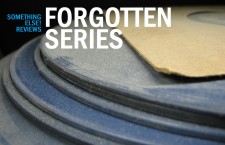After spending the last couple of weeks with the new records from Whitesnake and King Kobra, it’s only natural that I’d eventually turn to the album where the two factions met, 1989’s self-titled debut from Blue Murder.
When John Sykes was ousted from Whitesnake, along with most of the band that recorded 1987’s self-titled megahit record, he was offered a contract by Geffen Records. The label hoped that, as part of the writing team that had created gold for them in 1987, Sykes could bring more of the same with his next project.
The band he put together certainly had the pedigree for success. He recruited drummer Carmine Appice, who had a background spanning the rock spectrum from Rod Stewart to Ozzy Osbourne, and bassist Tony Franklin of The Firm and folk rocker Roy Harper’s band.
Unfortunately, Blue Murder never quite captured the lightning like Whitesnake did. The band had a minor hit with the song “Jelly Roll,” which had a slightly different sound than the rest of the debut record, then Appice and Franklin departed to be replaced by Marco Mendoza and Tommy O’Steen before the 1993 record Nothin’ But Trouble which fizzled and marked the end of a once-promising act — though Mendoza and O’Steen did follow Sykes into his solo band a little later on.
Their lack of commercial success, though, shouldn’t be taken as a judgment on the quality of this album. It’s hard to imagine such a potent lineup not delivering a solid record, and while Blue Murder had a few stinkers, like the ballad “Out of Love” and the clichéd “Sex Child,” most of the songs were impressive. There were, certainly, comparisons to be made to Whitesnake, as Sykes played a significant role in that band’s rise to popularity. Blue Murder had the same dramatic English style, and there were passages on the record, particularly on songs like “Sex Child” and “Billy” that echoed much of the 1987 Whitesnake sound. Heck, Blue Murder even played a couple of Whitesnake tunes when I saw them live in ’89. But other tracks made it clear that while that band was part of the heritage, Blue Murder was its own entity.
The first real hint of that comes on the third track, an epic, winding seven and a half-minute slab of heavy rock titled “Valley of the Kings.” The Egyptian-themed song had the perfect mixture of dramatic riffs and vocals from Sykes, blended with some irresistible grooving hooks both vocally and musically. It was a song matched only by the eighth track, “Ptolemy,” my personal favorite from the record. The song opens with a little bit of tribal music as a keyboard line fades in, building up to this monstrous strutting and squealing guitar bit from Sykes that offers everything you could ask for in a hard rock riff.
The other songs on the record are slightly less bombastic and dramatic than those two, but are still smoking pieces of music. “Blue Murder” delivers a straight-up hard rocker with more killer licks from Sykes and another big, memorable chorus. “Black-Hearted Woman” is a high-energy piece that has a little more of the commercial 1980s hard rock sound to it. Even the hit, “Jelly Roll,” brought something a little different to the table, with a Led Zeppelin-esque blues stomp layered over with ‘80s rock noises. Granted, the approach is a little heavy-handed at times, and it probably would have been a better song sticking with the simpler Zep formula and leaving off the synths and pomposity that come toward the end, but it’s still not a bad song.
It should go without saying that the musicianship is stellar. While Sykes’ guitar and voice are the main focal points, the star of the show may be Franklin, who riffs relentlessly on his fretless bass throughout the course of the record, yet always manages to remain locked in a groove with Appice, providing a well-grounded base for Sykes’ attention-grabbing flourishes.
When Blue Murder came out in 1989, I really liked it. As of this listening, though, it had been years since it had been off the shelf. I wondered how it would hold up once I dusted it off, and the answer is surprisingly well. There’s no doubt this record is a product of the 1980s. All of the hallmarks are there. At the same time, though, most of the songs have an appeal and staying power that many of their contemporaries lack. Though the band remains little more than a footnote in music history, the record is a hidden gem that fans of bombastic English hard rock should seek out if they haven’t heard it.
[amazon_enhanced asin=”B000V63A4G” price=”All” background_color=”FFFFFF” link_color=”000000″ text_color=”0000FF” /] [amazon_enhanced asin=”B003GSLU3E” price=”All” background_color=”FFFFFF” link_color=”000000″ text_color=”0000FF” /] [amazon_enhanced asin=”B000W016W4″ price=”All” background_color=”FFFFFF” link_color=”000000″ text_color=”0000FF” /] [amazon_enhanced asin=”B00437IE7M” price=”All” background_color=”FFFFFF” link_color=”000000″ text_color=”0000FF” /] [amazon_enhanced asin=”B004AV5H2G” price=”All” background_color=”FFFFFF” link_color=”000000″ text_color=”0000FF” /]
- How Black Sabbath’s Self-Titled Debut Invented a New Genre of Music - February 5, 2025
- Alestorm, Ratt, Zeal & Ardor + Others: Fred Phillips’ Best of 2024 Metal and Hard Rock Songs - January 26, 2025
- Cody Jinks, Blackberry Smoke + Others: Fred Phillips’ Best of 2024 Country and Southern Rock - January 20, 2025



